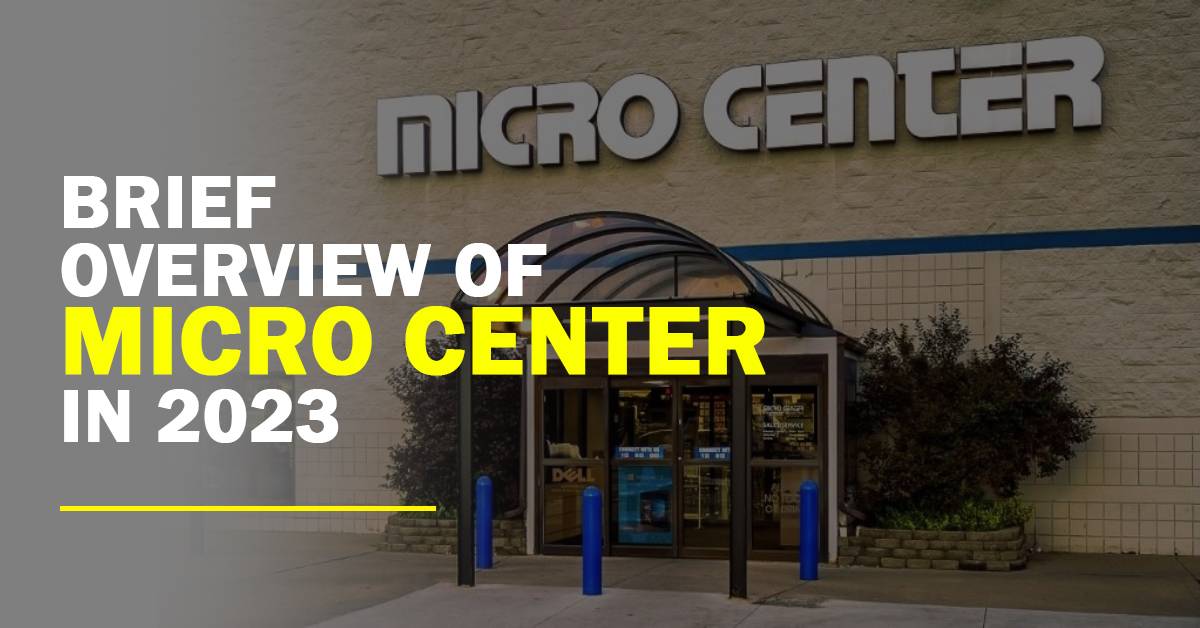
Table of Contents
ToggleWhat Is A Micro Center?

Micro Center is an American computer department store, which has its headquarters in Hilliard, Ohio. It was founded by John Baker and Bill Bayne in 1979, with the initial focus being on burgeoning microprocessor technologies. The store’s origins were in selling radio equipment and microprocessors, which were relatively niche markets at the time.
Today, it has become a popular destination for a broad range of computer parts, electronics, networking devices, software, gaming products, and more. It is particularly known for its extensive selection of computer hardware and accessories, offering both high-end, specialized components for PC builders and more common devices for the everyday consumer.
It had 25 retail stores across the United States. These brick-and-mortar stores are large, spanning around 20,000 to 60,000 square feet each, often laid out like a traditional department store but with sections devoted to different categories of technology and electronics.
In addition to the physical stores, they also operate an online store, which offers its full range of products for delivery. It also provides a store pick-up service, where customers can reserve products online and pick them up in their local store.
One of the distinguishing characteristics of this center is its commitment to customer service. Each of its stores has a knowledgeable, commissioned sales staff that can offer advice and assistance to customers, whether they’re looking for a simple accessory or planning a complete PC build.
They also offer technical support and repair services. The stores have dedicated service desks where customers can bring their devices for troubleshooting and repair, and the company also offers extended warranty plans for its products.
It’s important to check the latest information for updates beyond 2021, as the company may have undergone changes in its operations, store locations, or services.
The Birth Of Micro Center
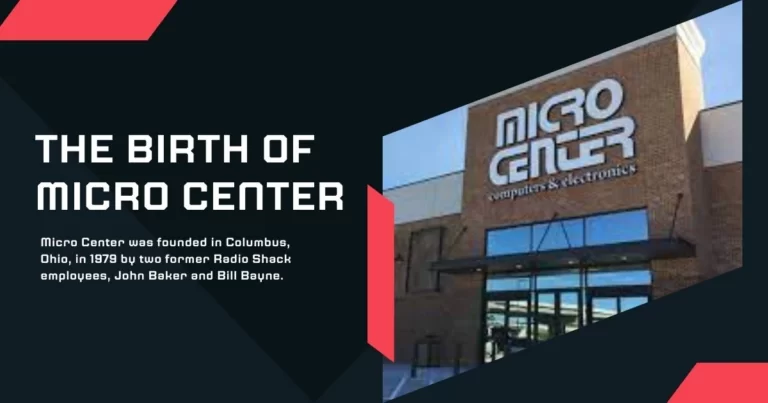
Micro Center was founded in Columbus, Ohio, in 1979 by two former Radio Shack employees, John Baker and Bill Bayne. Both of them recognized a trend towards do-it-yourself (DIY) computing, as personal computers were starting to become more common and accessible. They envisioned a store that could cater to both the everyday consumer as well as the tech enthusiast looking for specialized components.
Their first store was located on Bethel Road in Columbus and initially focused on selling microprocessor-based hobby kits, hence the name “Micro Center”. Their product offering was somewhat niche for the time, but as interest in personal computers grew, so did their business.
The company gradually expanded its product range to include software, hardware, accessories, and more. The founders took a customer-focused approach to their stores, aiming to provide not just products, but also the knowledge and support that customers would need to make the most of them.
The focus on customer service, along with its wide range of products, allowed it to grow and expand. By 2021, they had 25 stores in major markets across the United States.
However, they have retained their commitment to being a destination for computer enthusiasts. They continue to offer a broad range of components for PC builders, as well as knowledgeable staff who can provide advice and assistance on all things tech.
While the world of technology has changed dramatically since its inception, the company’s core values and focus on customer service have remained a constant. They’ve evolved with the times, but have stayed true to their original goal of being a comprehensive resource for computer and electronics customers.
History Of Micro Center

Micro Center was founded in Columbus, Ohio, by John Baker and Bill Bayne in 1979. Both founders were former Radio Shack employees who had a vision of creating a store catering to the then-emerging market of personal computing.
Their first store, located on Bethel Road in Columbus, specialized in microprocessor-based hobby kits, hence the name “Micro Center”. At the time, the concept was somewhat niche, but the trend of personal computing was starting to take off, and their business began to grow along with it.
In the 1980s, as personal computers became increasingly popular and accessible, it expanded its product range to include software, hardware, accessories, and more, serving both the everyday consumer and the tech enthusiast.
By the 1990s, the company had started to establish more locations across the United States, becoming a go-to source for computer hardware and electronics. During this time, it was recognized for its wide range of products and commitment to customer service, including knowledgeable sales staff who could offer advice and assistance to customers.
In the 2000s and 2010s, the company continued to expand and evolve with the times. It embraced the rise of online shopping by launching its own online store. However, the company remained committed to its brick-and-mortar stores, which were often located in major urban areas.
Throughout its history, it has stood out for its focus on customer service and its wide selection of products. The company employs tech-savvy sales staff and offers in-store technical support and repair services, making it a valuable resource for anyone interested in electronics and computing.
Micro Center Retail Experience
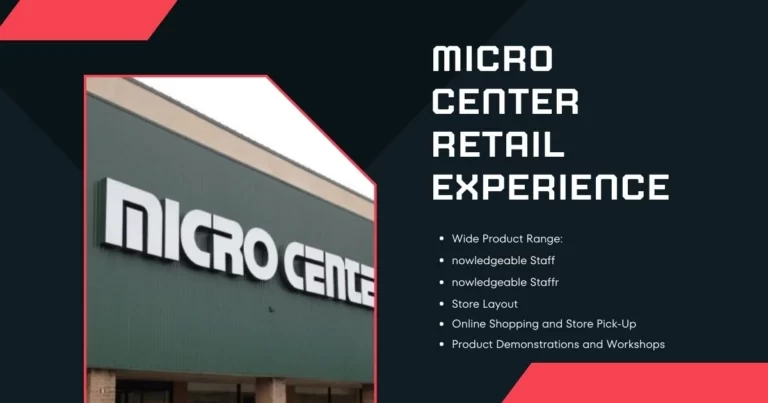
It provides a unique retail experience, especially for tech enthusiasts and do-it-yourself PC builders. As of my last training cut-off in September 2021, the company operated 25 large brick-and-mortar stores across the United States, each store spanning 20,000 to 60,000 square feet, presenting a vast selection of products.
Here are some key aspects of the Micro Center retail experience:
- Wide Product Range: Its product offerings range from computers (desktops, laptops, tablets), computer accessories, networking devices, and software, to gaming consoles, electronics like TVs and audio systems, and more. The store is particularly noted for its extensive selection of computer hardware and components, catering to both general consumers and specialized PC builders.
- Knowledgeable Staff: One unique aspect of its retail experience is the presence of commissioned, knowledgeable sales staff. They are trained to provide in-depth advice and assistance to customers on a wide range of tech products. Whether a customer is seeking to buy a simple accessory or embarking on a comprehensive PC build, the sales staff can offer expert guidance.
- In-store Technical Support and Repair: It provides technical support and repair services at its physical locations. If customers have issues with their devices, they can bring them to the store for troubleshooting and repairs, which adds an extra layer of convenience and reliability to the shopping experience.
- Store Layout: The stores are often laid out similarly to traditional department stores but with sections devoted to different categories of technology and electronics. This allows customers to easily find the product category they’re interested in.
- Online Shopping and Store Pick-Up: Besides the physical stores, it also operates an online store, where customers can check out their entire range of products for home delivery or store pick-up. The latter service lets customers reserve a product online and then pick it up at their local store.
- Product Demonstrations and Workshops: Some of its stores hold product demonstrations and workshops to help customers understand new products or technologies. These events can offer customers the opportunity to get hands-on experience with products before they buy them.
As the specifics may vary by location and over time, it’s always a good idea to check the latest information on its website or contact a local store for the most accurate and recent details.
Micro Center’s Unique Value Proposition
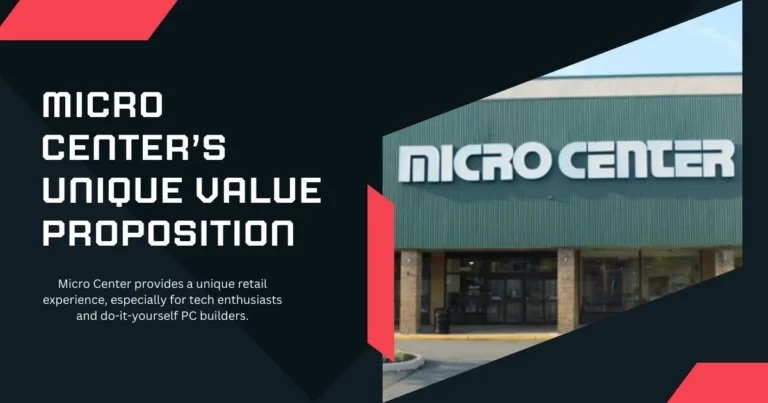
Micro Center has carved out a distinct niche in the retail electronics market with a unique value proposition that sets it apart from many of its competitors. Here are some of the key aspects:
- Wide Selection of Tech Products: It offers an extensive range of products, from desktops, laptops, and tablets to peripherals, software, gaming equipment, and other electronics. They cater to both everyday consumers and tech enthusiasts, particularly those interested in building their own PCs. The breadth of their inventory is quite vast, allowing customers to find nearly any component or accessory they may need.
- In-Depth Expertise: It employs knowledgeable, tech-savvy staff who can provide customers with in-depth advice and assistance. This commitment to customer service is a significant part of their value proposition. Whether a customer is seeking a simple device or embarking on a complex PC build, the sales staff can offer expert guidance.
- In-Store Technical Support and Repair: Another key aspect of this center’s value proposition is its in-store technical support and repair services. If customers encounter problems with their devices, they can bring them to their store for troubleshooting and repairs, providing a level of post-purchase support that many online retailers can’t match.
- Physical Retail Presence: Even in the era of online shopping, it maintains a strong brick-and-mortar retail presence. This allows customers to see, touch, and test products before making a purchase, which can be particularly valuable when shopping for high-end tech products.
- Competitive Pricing: It often offers competitive prices, particularly on computer components and peripherals. This, coupled with their wide selection, makes them a go-to destination for PC builders and tech enthusiasts.
- Online Shopping and Store Pick-Up: To complement its physical stores, it also offers an online shopping experience. Customers can order products for home delivery or reserve products for in-store pickup, providing flexibility and convenience.
- Community Engagement: It often hosts in-store workshops, product demonstrations, and other events, helping to educate customers and foster a sense of community among tech enthusiasts.
All these elements combine to create a unique value proposition that has helped them to thrive in a competitive market. Their focus on selection, expertise, customer service, and community engagement makes them not just a retailer, but a destination for tech enthusiasts.
The Early Days: Struggles And Triumphs
While there isn’t an abundance of publicly available detailed information on the early struggles and triumphs of Micro Center, it is known that the company was founded in 1979 by John Baker and Bill Bayne, two former Radio Shack employees. Here is a broad overview of the challenges and achievements that they likely faced in the early years of the business.
Struggles:
- Emerging Market: In the late 1970s, the personal computer was a new concept. The market was only just emerging, and convincing consumers to invest in what was then a high-cost and relatively unfamiliar technology likely proved a significant challenge.
- Limited Products: Initially, it specialized in selling microprocessor-based hobby kits. Given the niche nature of these products, expanding their customer base would have been a considerable challenge.
- Competition: With larger, more established players in the electronic retail market, such as Radio Shack, it would have faced tough competition and the daunting task of carving out a unique market space for itself.
Triumphs: - Riding the Wave of Personal Computing: It was founded just as the personal computing revolution was beginning to take off. By offering products that catered to this burgeoning market, they were able to ride the wave of increased interest in personal computing.
- Focus on Customer Service: From the start, it has emphasized providing excellent customer service and hiring knowledgeable staff to offer in-depth advice and assistance to customers. This focus on service differentiated them from many competitors and helped them to build a loyal customer base.
- Expansion of Product Range: As the company grew, it expanded its product range to include not just computer parts but also peripherals, software, and other electronics. This allowed the company to cater to a broader customer base and capitalized on the growing market for tech products.
- Physical Retail Stores: Despite the rise of online retail, it continued to invest in brick-and-mortar stores. This allowed customers to see, touch, and test products before making a purchase, which helped them to stand out in a crowded market.
While these points provide a general idea of the likely struggles and triumphs of this Center in its early days, for more detailed and specific information, it would be best to reach out to the company directly or refer to any company histories that may have been published.
From Niche Market To Mainstream
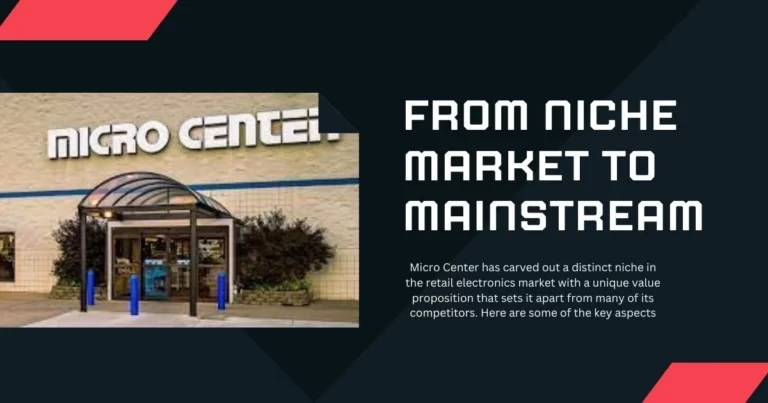
Micro Center’s journey from a niche market player to a mainstream retailer is an impressive story of strategic growth, evolving market focus, and keen attention to customer needs. Here is a broad overview of how the company expanded its operations:
- Starting with a Niche Focus: It was founded in 1979 by John Baker and Bill Bayne, who envisioned a store that could cater to the burgeoning market for microprocessor technologies. Their first store, located in Columbus, Ohio, specializes in selling microprocessor-based hobby kits, appealing to a small but growing market of tech enthusiasts and early personal computing adopters.
- Broadening the Product Range: As the personal computing market started to boom in the 1980s, it responded by expanding its product line to include a wide variety of computer hardware and software. This was a crucial step in moving from a niche market player to a more mainstream electronics retailer.
- Geographic Expansion: Once they had established a successful business model, they began to open new stores in other locations. The company gradually expanded its footprint across the United States, strategically choosing locations in or near major metropolitan areas. This geographic expansion was crucial in allowing them to reach a larger customer base.
- Emphasizing Customer Service: Despite its growth, it retained its commitment to providing excellent customer service. The company continued to hire and train knowledgeable sales staff who could provide in-depth advice and assistance to customers. This focus on customer service helped them differentiate itself from other electronics retailers and build a loyal customer base.
- Leveraging the Online Marketplace: In addition to its physical stores, it recognized the potential of the online marketplace and launched an e-commerce platform. This move further broadened its customer reach, allowing the company to serve customers nationwide, even in areas without a physical store.
- Catering to Tech Enthusiasts: While becoming more mainstream, they did not lose sight of their roots in the tech enthusiast community. The company continued to offer a wide range of specialized components for PC builders, helping it maintain a unique position in the market.
By carefully balancing growth and customer service, this Center managed to transition from a niche market player to a mainstream retailer, while still maintaining its unique appeal to tech enthusiasts. As of my knowledge cut-off in September 2021, they operated 25 stores across the United States, standing as a testament to its successful expansion strategy. For the most recent updates, you would need to visit the company’s official website or contact them directly.
Micro Center's Product Lines And Services

Micro Center offers a wide range of products and services catering to both general consumers and tech enthusiasts. As of my last training data in September 2021, their offerings include:
Product Lines:
- Computers: This includes desktops, laptops, all-in-one computers, and tablets from a variety of manufacturers. They also offer computer cases and barebone kits for customers who want to build their own systems.
- Computer Parts: Micro Center has an extensive selection of computer parts, such as CPUs, motherboards, graphics cards, RAM, hard drives, SSDs, power supplies, and more. This makes them a favorite destination for PC builders.
- Peripherals: They sell a wide variety of peripherals including monitors, keyboards, mice, printers, scanners, and webcams, among others.
- Networking: This includes routers, network switches, modems, network-attached storage (NAS) devices, and other networking accessories.
- Software: Micro Center offers a range of software, including operating systems, antivirus software, office software, and more.
- Electronics: Apart from computers, they also sell TVs, audio systems, smart home devices, drones, and other electronics.
- Gaming service: They cater to gamers with gaming desktops and laptops, gaming consoles, virtual reality gear, game controllers, and video games.
- In-Store Technical Support and Repair: Micro Center provides technical support and repair services at their stores. If customers have issues with their devices, they can bring them in for troubleshooting and repairs.
- Knowledgeable Sales Staff: Their staff can provide in-depth advice and assistance to customers on a wide range of tech products.
- Online Shopping and Store Pick-Up: Besides the physical stores, Micro Center also operates an online store where customers can order products for home delivery or reserve products for in-store pick-up.
- Extended Protection Plans: Micro Center offers extended protection plans for its products, providing additional peace of mind for customers.
Financing: They offer various financing options, like credit card and leasing services, to help customers afford their purchases. - In-Store Events: Some Micro Center stores host in-store events, such as product demonstrations and workshops, to help educate customers about new products or technologies.
Please note that for the most accurate and recent details, it would be best to check Micro Center’s official website or contact them directly, as some of this information may have changed after my last training data in September 2021.
Impact Of Micro Center On Tech Retail Industry
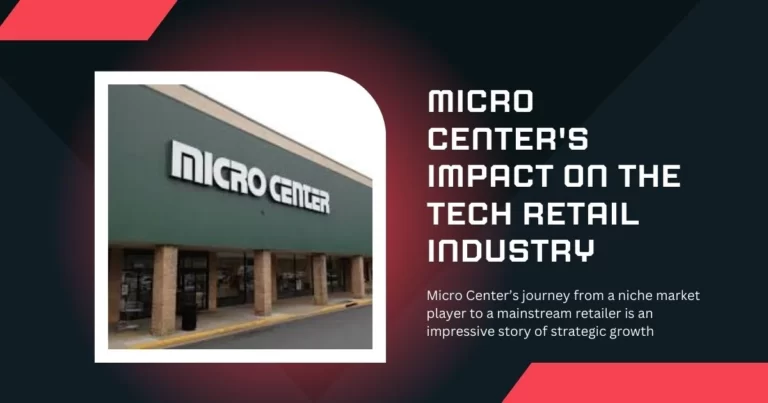
Micro Center has had a notable impact on the tech retail industry, especially in the United States, in several ways:
- A Destination for PC Builders: It has become a go-to resource for PC builders, thanks to its extensive selection of components, peripherals, and accessories. Their inventory often includes the latest and most high-performance parts, making them a one-stop shop for builders looking to create custom systems. This has helped to foster and support the PC building community.
- Prioritizing Customer Service: The company has set a high bar in terms of customer service, employing knowledgeable, tech-savvy staff who can provide expert advice and guidance. This level of service is not always common in tech retail, particularly in larger chain stores, and it has distinguished Micro Center in the industry.
- Bridging Online and Offline Retail: While many retailers have struggled to balance online and brick-and-mortar sales, they have managed to bridge the two effectively. Customers can research and reserve products online, then pick them up in-store, allowing for the convenience of online shopping without the uncertainty that sometimes comes with it.
- Technical Support and Repair: By offering in-store technical support and repair services, Micro Center has provided a level of post-purchase support that many online retailers cannot match. This has not only benefited customers but also set an example for other retailers.
- Community Engagement: Through in-store events like workshops and product demonstrations, Micro Center has contributed to tech education and fostered a sense of community among tech enthusiasts. This kind of engagement goes beyond simple retail and demonstrates a deeper commitment to supporting and promoting technology use and understanding.
- A Broad Range of Products: By offering a wide range of products, from desktops and laptops to software and electronics, Micro Center has become a comprehensive source for tech needs. This extensive offering has forced other retailers to expand their own product lines to stay competitive.
In summary, Micro Center has made a significant impact on the tech retail industry by raising the bar in terms of customer service, product variety, community engagement, and integrating online and offline sales. Their model provides a compelling example of how tech retail can cater to both general consumers and specialized tech enthusiasts.
The Future Of Micro Center’s Industry
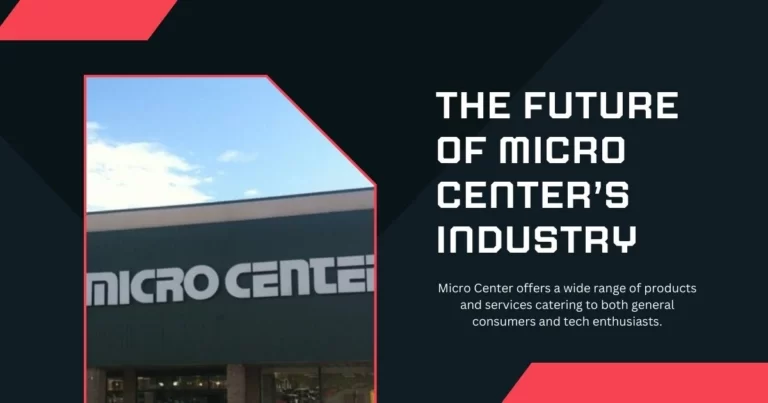
The future of Micro Center’s industry – namely, electronics and tech retail – will be influenced by various factors including emerging technologies, evolving consumer behaviors, and changes in the global economic and retail landscape. Here are a few key trends and predictions as of my last training data in September 2021:
- E-commerce Growth: The rise of online shopping is expected to continue. The COVID-19 pandemic further accelerated this trend, as more consumers turned to online platforms for their shopping needs due to lockdowns and social distancing measures. Retailers like Micro Center that can effectively integrate online and offline experiences are likely to continue to see success.
- Continued Importance of Physical Retail: Despite the growth of e-commerce, physical stores remain important, especially for tech products that consumers often want to see and try before they buy. Retailers will need to continue to make the in-store experience worthwhile, through excellent customer service, in-store events, or other value-added services.
- Customization and Personalization: As consumers become more tech-savvy, there’s likely to be increased demand for customization and personalization. This includes not just customized products, but also personalized shopping experiences. Micro Center’s focus on the PC builder community aligns well with this trend.
- Emerging Technologies: Emerging technologies, such as AI, IoT, VR/AR, 5G, and others, will likely create new product categories and customer needs. Retailers who can quickly adapt to these changes and offer the latest products will have an edge.
- Sustainability: There’s growing consumer interest in sustainability, including in the tech industry. This might affect demand for products with better energy efficiency, longer lifecycles, or produced with sustainable practices. There might also be increased demand for services like device repair or recycling.
- Services and Solutions: Beyond selling products, there’s a growing trend for retailers to offer more services and solutions. This includes things like device setup, tech support, and other post-purchase services.
- Direct-to-Consumer Brands: As more manufacturers sell directly to consumers, traditional retailers will need to demonstrate why consumers should still purchase through them. This could involve exclusive products, better pricing, superior service, or other unique selling propositions.
Keep in mind, these are only trends and predictions based on information available up to September 2021. The actual future could unfold differently due to a variety of unpredictable factors. For the most accurate and recent insights, it would be best to conduct new market research or consult industry experts.
Who Owns Micro Center?
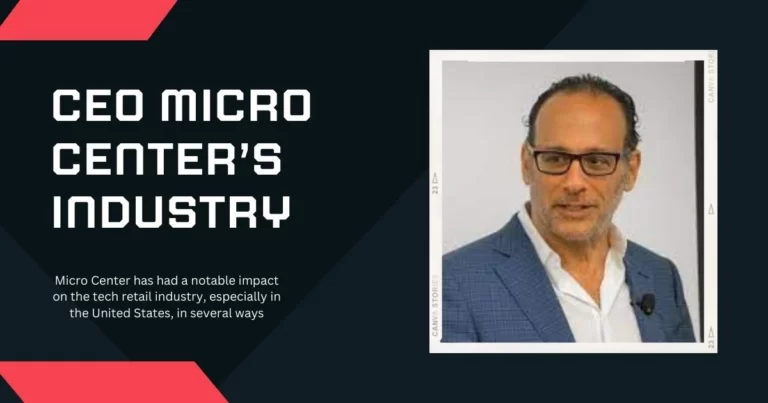
Micro Center is a privately held corporation that was founded by John Baker and Bill Bayne in 1979. As of my last update in September 2021, Micro Electronics, Inc., also a privately held corporation, is the parent company of Micro Center. Micro Electronics, Inc. is a corporation that has been in the electronics industry since the 1970s and is headquartered in Hilliard, Ohio.
Both Micro Center and Micro Electronics, Inc. are part of the broader electronics and tech retail industry, which is not “owned” by any single entity. Instead, this industry is composed of many businesses of varying sizes, from large multinational corporations to smaller, independent retailers. Each contributes to the industry in its own way and competes for market share based on factors like product selection, price, customer service, and brand reputation.
For the most current information about its ownership, I would recommend visiting the company’s official website or contacting them directly.
- Micro Center Parent Company
Its parent company is Micro Electronics, Inc., a privately held corporation headquartered in Hilliard, Ohio. Micro Electronics, Inc. was founded in the 1970s and has been involved in the electronics industry ever since, with them being one of its primary retail outlets. As of my last update in September 2021, John Baker and Bill Bayne, the founders of Micro Center, were key figures in Micro Electronics, Inc. For the most recent and accurate information, please refer to the official Micro Center or Micro Electronics, Inc. websites or contact them directly. - Micro Center Electronics Company
Micro Center is a leading electronics and computer retailer in the United States. Founded in 1979, it’s known for offering a broad range of products, including computers, electronics, networking equipment, gaming devices, software, and other technology products and accessories.
Micro Center is often recognized for its extensive selection of products that cater to both general consumers and tech enthusiasts, especially those interested in building their own PCs. The stores usually offer an array of desktops, laptops, computer parts, peripherals, and more from various manufacturers.
In addition to selling products, Micro Center also offers technical support and repair services. Its staff members are known for being knowledgeable and are often able to offer expert advice to customers. Furthermore, many Micro Center locations host in-store events, such as workshops and product demonstrations, which have helped to foster a sense of community among tech enthusiasts. - Micro Center Cambridge
Micro Center has a location in Cambridge, Massachusetts, which serves as one of its retail outlets. As of my last update in September 2021, this store, like other Micro Center locations, offers a wide range of electronics, computer products, and other technology-related items.
Customers can find various products including desktop computers, laptops, computer parts for DIY projects, peripherals, networking equipment, software, gaming devices, and other consumer electronics. In addition to products, Micro Center Cambridge also offers services such as technical support and repair, in-store pick-up for online orders, and occasionally, in-store workshops or events.
The store is known for its knowledgeable and helpful staff who can assist customers with their technical queries and guide them in purchasing the right product based on their needs.
Please note that for the most accurate and up-to-date information about Micro Center Cambridge’s operating hours, inventory, and in-store events, you should visit the official Micro Center website or contact the store directly. Information might have changed after my last training cut-off in September 2021.

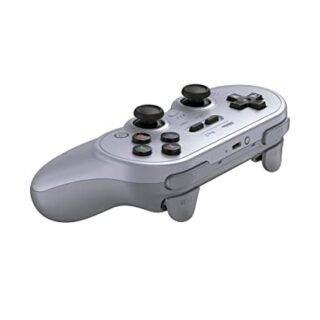
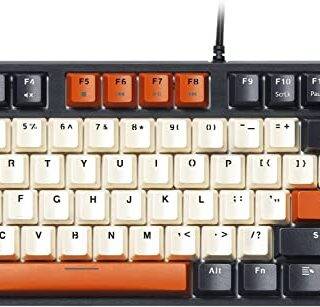

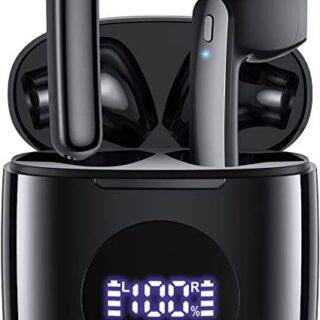
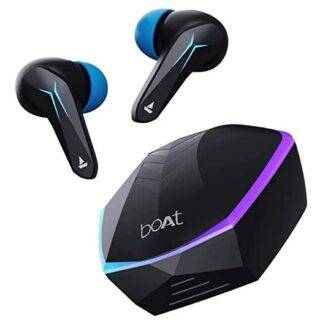
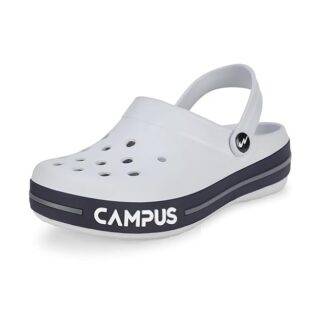
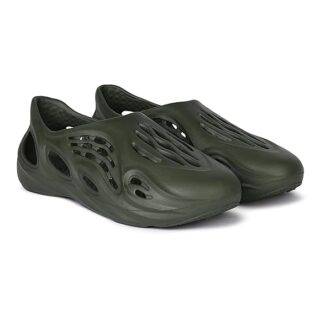


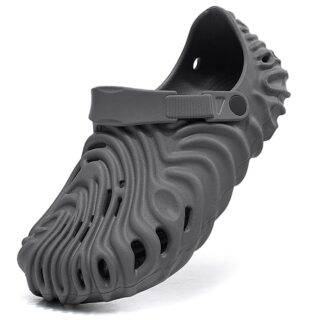
Leave a Reply